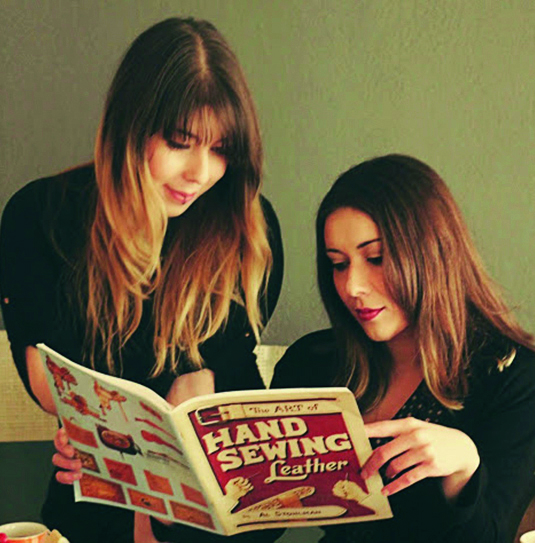Young Voices: Advice to cities on the labour market
Edited on
18 April 2016Four young individuals share their experiences in the labour market and how cities can help assist youth.

This is an excerpt of the article featured in the URBACT Capitalisation 'Job generation for a jobless generation,' to read the full article click here.
 Christianna Vei (aged 27), Started her own shoemaking company with her sister Callie, Thessaloniki, Greece
Christianna Vei (aged 27), Started her own shoemaking company with her sister Callie, Thessaloniki, Greece
Interviewed by Nicholas Karachalis, Lecturer and Researcher in Cultural/Tourism Development and the City
Tell me a bit about your experiences of the labour market
Although I am by profession a musician and my sister Callie is a photographer, we decided to revive our parents’ leather business, which like many others in Thessaloniki had closed down as it wasn’t able to adapt to the city’s new economic situation. We use a very traditional technique and make our shoes by hand, which means that our production is limited. Most of our sales are made through the Internet to other countries and although demand is high and we have the support of our parents, it is still difficult to make a living.
What sort of challenges do you face?
The main difficulty is linked with the fact that there is no information, mentoring or networking opportunities with other young entrepreneurs. Until my involvement in the Creativity Platform and my presentation during the URBACT My Generation at Work network’ s workshop I hadn’t realised that this kind of support was available. The discussions with youth employment experts and young entrepreneurs were really important to us and we got some new ideas for partnerships. Since our capacity to expand is rather limited too much publicity and higher demand could actually create problems. Time management is rather difficult for us and we can’t spend too much time on organisational issues. So networking is important for our business. What we have noticed is that being a small company creates a certain flexibility but also difficulties; in our case we are facing problems regarding the supply of small amounts of materials as wholesalers do not bother to work with us. We need specialised sub-contractors which are difficult to find locally and in some cases we have to travel in order to meet crafters, designers, etc. Being part of a wider network that would provide information and matchmaking would be really helpful.
What do you think the city could do to help young people like you to set up sustainable businesses?
A creative agency that would help out young entrepreneurs to confront everyday difficulties (accounting, financing, legal issues, business administration etc.) would be a great idea – there is no public support of this kind at the moment. Any further initiative that would bring young entrepreneurs together would be very welcome.
 Dóra Németh (aged 20), Student at the Food industrial polytechnic, participant in the Youth Employment Forum initiative, Nyíregyháza, Hungary
Dóra Németh (aged 20), Student at the Food industrial polytechnic, participant in the Youth Employment Forum initiative, Nyíregyháza, Hungary
Interviewed by Béla Kézy, Director of MEGAKOM Development Consultants and Urban Development Expert in Hungary and thematic expert of the URBACT Roma-Net II network
You will soon finish your studies. How do you see your future in the labour market?
Following my studies I will be a food industrial technician – a profession that is currently in demand – so I am optimistic. I am quite certain I will find a job. In fact, I have already worked in a food industrial laboratory as student worker, and I have actually been offered a full time job there. Whether this is a job I want to do – well that’s a different question. My dream is to work in a chocolate factory – but to do that I would have to move to another region of Hungary.
Would you be ready to do that? How important are labour market opportunities in selecting where you want to live?
Actually I love Nyíregyháza; it’s a lovely, beautiful and vivid city – liveable for young people, and my family and friends are all here – so yes, I would be happy to stay here. Nevertheless, I really want to do something that I love, so if I have to choose between a good job opportunity and my hometown, I would not hesitate to seize the job opportunity, even if that means that I have to leave this city.
What support would young people need on the labour market? How do you think cities can help?
A couple of things would be important. To start with, it is crucial to learn things at school that have at least something to do with what is expected in the labour market. Currently, there is a huge gap between what is taught at schools and what is expected by employers. Probably that is why companies are looking for people with at least 1 or 2 year professional experience. More opportunities for student work, apprenticeships would be also useful – as my example shows, it is a great way to gain experience and even access to job opportunities. Cities could maybe offer incentives for companies to hire young people or develop special programmes to prepare young people and school leavers for the labour market. I think the Youth Employment Forum in Nyíregyháza is also a good initiative – facilitating dialogue between the employers and young people is an important step to promote better mutual understanding – so I am happy to participate!
 James Fleury (aged 23), Start-up Director, Nouvague Ltd – Innovative Marketing for Classical Music, London, UK
James Fleury (aged 23), Start-up Director, Nouvague Ltd – Innovative Marketing for Classical Music, London, UK
Interviewed by Alison Partridge, Co-ordinator of the URBACT workstream ‘Job generation for a jobless generation’
Tell me a bit about yourself and what you think the labour market holds for you?
At the time of writing, I am about to launch my company – a music marketing agency for classical music –with financial support from a UK based charity called ‘The Prince’s Trust’, and have just been appointed Managing Director of a Los Angeles-based music programme for international students, which receives its first pilot this October.
Wow – that’s impressive. Have you encountered any barriers along the way?
It seems like a good position to be in at 23 years old. But the stark reality is that the journey to this point has been distressing, lonely, and incredibly challenging financially. It’s not that I’m resentful of life in the 70s and 80s, but for my parents, a full mortgage on a house was a reality, and for budding entrepreneurs, you could turn up at the bank with an astute business plan and walk away with a decent sized low-interest loan. Factoring all expenses, the start-up costs for my company are really quite small – around €12,000. Over the last few months, I’ve received phone calls, e-mails and letters from some of the leading classical music personnel in the UK and abroad, expressing their excitement at Nouvague’s birth. With a growing portfolio of internationally-respected clients, it’s disheartening that I still find myself scraping and searching for every penny to get my idea off the ground.
So, why did you opt to set up your own company if it is so hard?
You’re right: I chose self-employment. But, after leaving a secure position in Marketing at a leading interactive television company, I felt that it was the best option I had in providing a financially secure future for me, and my eventual family. In my prospective role as a Young Ambassador for ‘The Prince’s Trust’, I hope to provide more air-time at schools and colleges for non-higher-education career opportunities. When I was 16, all the talk at school was about universities. Vocational courses, full-time employment and enterprise were all fictional anecdotes that once existed in a utopian society. In this way, we’re brainwashing our children to believe that if you want to be successful, it is necessary go to university. I don’t believe that is the case.
And what do you think cities can do to help?
I would be encouraged to see cities commit to low-interest lending for young entrepreneurs by means of an intensive scrutiny process and to give stronger emphasis to vocational training advertising. In turn, this would act as a catalyst for reducing young unemployment by developing the next generation of aspiring businessmen and women, and in the process revisit the true value of a university education. It seems a long way off right now, but it’s a small change that provides a long-term solution to the country’s employment challenges for young people.
 Jenna Norman (aged 20), Student and Aurora Intern, Birmingham, UK
Jenna Norman (aged 20), Student and Aurora Intern, Birmingham, UK
Interviewed by Alison Partridge, Co-ordinator of the URBACT workstream ‘Job generation for a jobless generation’
Tell me about your thoughts on what the labour market holds for you
I have been fortunate so far in that I have been employed in low skilled, part-time work, whilst in education, since I was 16. However, I am now at university and thinking about a ‘career’ is extremely daunting. Supporting friends through awful experiences in the job market has amplified this apprehension. One of my close friends for example was offered an apprenticeship last year with a municipality for a fraction of the minimum wage. Nevertheless, having an internship has taught me the importance of experience. Seemingly insignificant skills like how to organise and chair a meeting, communication skills or managing a budget will become invaluable in the future. Even now at university, where I am on the committee for a society, I notice that others are impressed with my organisational skills developed as a result of this experience.
What do you think cities can do to help?
I think this URBACT work is extremely important in understanding employers’ attitudes towards young people and more importantly how to change them. This is the responsibility of cities that need to provide incentives for both employers and young people to take on apprenticeships and paid work experience. By employing me and other young people as interns I think URBACT is ‘walking the walk’ as well as ‘talking the talk’. Cities need to do this as well.
To read the full Job Generation for a Jobless Generation publication please click here. Also check out our video on the topic.
To read more of our other Capitalisation work please click here.
Photo Credit: Giorgio Montersino Flickr
 Submitted by URBACT on
Submitted by URBACT on




